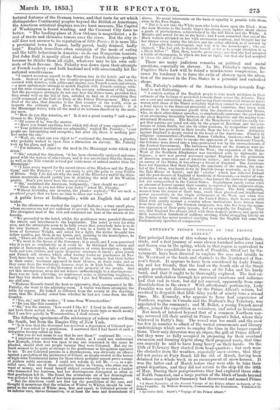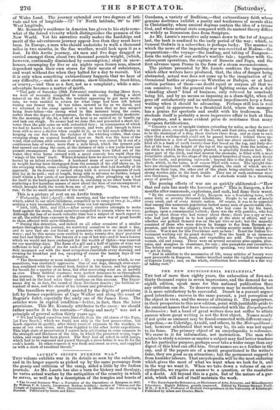KENNEDY'S SECOND VOYAGE OF THE PRINCE ALB ER T.
THE principal feature of this volume is a winter beyond the Arctic circle, and a foot journey of some eleven hundred miles over land and frozen seas in the spring, which in that region is equivalent to winter. The expeditions in search of Franklin, fitted out by Go- vernment, have been directed to explore the seas and islands to the Westward or the lands and channels to the Northward of Bar- row's Strait. It appears to have been considered by Lady Frank- lin and her friends, that the land on the South side of the Strait might perchance furnish some traces of Sir John and his hardy band, and that it ought to be thoroughly explored. The first ex- pedition undertaken through her personal exertions and influence had that end in view, but did not succeed, apparently from some dissatisfaction in the crew.f With affectionate pertinacity, Lady Franklin was not discouraged by the Prince Albert's return, but resolved to despatch that little fairy yacht of ninety tons a second time. Mr. Kennedy, who appears to have had experience of Northern regions in Canada and the Hudson's Bay Territory, was appointed to the command ; and M. Bellot, a young French naval officer, joined the expedition as volunteer, and, acted as lieutenant.
Not much of interest beyond that of a common Northern voy- age occurred till their arrival in Prince Regent's Inlet, where they wintered in Batty's Bay. The vessel was too small and the crew too few in number to admit of the varied amusements and literary undertakings which serve to employ the time in the larger expedi- tions. Their only diversion was an organ, the gift of Prince Albert ; but they were so fully occupied in preparing for their overland excursion and forming depOts along their proposed route, that time can scarcely be said to have hung heavy on their hands. On the 25th of February they started from head-quarters; but such were the obstacles from the weather, especially snow-storms, that they did not arrive at Fury Beach till the 5th of March, having been detained for a whole week in an encampment of snow-houses. It was the latter end of March before they were able to take their grand departure, and they did not return to the ship till the 30th of May. During their peregrinations they had explored three sides of North Somerset, and a large portion of the block of lands beyond it, whose coast Captain Ommaney had discovered and named Prince
• A Short Narrative of the Second Voyage of the Prince Albert in Search of Sir John Franklin. By William Kennedy, Commanding the Expedition. Published by Dalton.
+ Spectator 1851. Snow's "Voyage of the Prince Albert." of Wales Land. The journey extended over two degrees of lati- tude and ten of longitude-72' 740 North latitude, 900 to 1000 West longitude.
Mr. Kennedy's residence in America has given to his style some- what of the forced vivacity which distinguishes the penmen of the New World. Yet his narrative really makes the hardships and merit of the adventurous journey appear less than they must have been. In Europe, a man who should undertake to walk a thousand miles in two months, in the fine weather, would look upon it as a feat. In this Arctic journey, six men and five dogs dragged or carried amongst them about two thousand pounds weight, (which, however, continually diminished by consumption,) slept in snow- houses, encamping for five or six nights upon frozen seas, almost dependent upon their own stores for their means of subsistence, and went without fire when they halted for a day to recruit. Yet it is only when something extraordinary happens that we hear of any difficulty,—sueh as snow-storms, snow-blindness, frost-bites, or scurvy,—and then as a fact, not as a complaint ; while a mis- adventure becomes a matter of mirth.
"The: gale of Saturday (28th February) continuing during (three days, we were of necessity compelled to remain in camp. During a short interval on the 2d of March, the weather appearing to get more mode- rate, we were enabled to return for what cargo had been left behind during our former trip. It was taken onward as far as we dared, and we returned to the camp against a wind so keen that no face escaped being frost-bitten—the strong wind in this instance being the cause, rather than the degree of temperature, for this was comparatively moderate. On the morning of the 3d, a lull of an hour or so enticed us to bundle up and lash our sleigh. No sooner had we done this and proceeded a short dis- tance than the gale came on with redoubled fury ; in consequence of which we had to hasten back to our snow retreat, and were glad enough to have been still so near a shelter when caught by it, as we had much difficulty in keeping on our feet from the vielence of the whirling eddies, that came sweeping along an exposed headland near us. Such was the force of the wind, that column after column of whirling spray was raised by it out of a continuous lane of water, more than a mile broad, which the present gale had opened out along the coast, at the distance of only a few yards from our present encampment. As these successive columns were lifted out of the water, they were borne onward with a speed scarcely less rapid than the 'wings of the wind' itself. Whilst detained here we narrowly escaped being buried by an infant avalanche. A hardened mass of snow of several tons in weight having been disengaged from the summit of the cliff above us, by the sweeping winds, came rolling down with a noise that told fearfully of its approach. In its descent it carried along with it several fragments of rock that lay in its path ; and at length, being able to advance no farther, lodged itself within a few yards of our present dwelling, after ploughing up a bed for itself in the hard-packed snow before it, and doing us no other harm than scattering a few harmless masses of snow about the base of our encampment ; which .brought forth the words from one of our party, Come, boys, let us run,' to the no small merriment of the rest."
This is a picture of rest on an Arctic tramp.
" Wednesday, 13th [April]. —Still snowing' and the weather very thick ; which, added to our snow-blindness, compelled us to camp at two p. at., after making a very inconsiderable distance from our last encampment. "14th, 15a, 16th, and 17 th.—After several abortive attempts to make head against the storm, found ourselves compelled to remain where we were. Although the loss of so much valuable time was a subject of much regret to us all, the relief from exposure to the glare of the snow was of great benefit to those affected with snow-blindness.
"During this detention, and indeed on all other occasions of a similar nature throughout the journey, we restricted ourselves to one meal a day, and to save fuel ate our biscuit or pemmican with snow or ice instead of water; and by this means were enabled to make twenty-five days' provision and fuel last thirty-five. The luxury of a cup of hot tea—and it was a luxury which we would not have exchanged for the wealth of Ophir—was reserved for our marching-days. The flame of a gill and a half of spirits of wine was sufficient to boil a pint of tea for each of our party ; and this quantity was duly measured out with the most scrupulous exactitude every morning and evening for breakfast and tea, excepting of course the barium days of our
detention. * * * "The thermometer at noon indicated ± 22; a temperature which, to our sensations, was absolutely oppressive. One of our dogs, through over-exer- tion combined with the unusual heat, fainted in his traces, and lay gasping for breath for a quarter of an hour, but after recovering went on as merrily as ever. These faithful creatures were perfect treasures to us throughout the journey. They were all suffering like ourselves from snow-blindness, but did not in the least relax their exertions on this account. The Esqui- maux dog is, in fact, the camel of these Northern deserts ; the faithful at- tendant of man, and the sharer of his labours and privations."
The travellers were greatly assisted by the &pits of provisions left by former expeditions at Cape Walker and along the coast of Regent's Inlet, especially the early one of Sir James Ross. The articles were in capital condition—better, in fact, than the later provisions. This Mr. Kennedy attributes to the cases : we should rather ascribe it to the contents—" cheap and nasty" was not a principle of general action thirty years ago. "We had helped ourselves very liberally from the old stores of the Fury, at Fury Beach,] which we found not only in the best preservation, but much superior in quality, after thirty years of exposure to the weather, to some of our own stores, and those supplied to the other Arctic expeditions. This high state of preservation I cannot help attributing in some measure to the strength and thickness of the tins, in which the preserved meats, vege- tables, and soups had been placed. The flour had all caked in solid lumps, which had to be reground and passed through a sieve before it was fit for the cook's hands. In other respects it was fresh and sweet as ever, and supplied us with a stock of excellent biscuit."



























 Previous page
Previous page